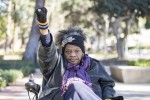Constance Cheeks was one of the first black students to attend an all-white Virginia high school in 1968. Her school experience motivated her to continue her activism at UCLA, more than 40 years later.
Cheeks, who returned last year to pursue a degree in African American studies and continue her activism, died on Jan. 28 after battling bone cancer. She was 63. She dropped out of UCLA in 1974 – her sophomore year – to support herself and work full time.
Cheeks said she hoped to inspire the next generation of students with her actions in an interview with the Daily Bruin before she died. She said her first bus ride to her all-white high school sparked her interest in activism.
“Oh God, was I nervous,” she said. “We took the school bus and they threw spitballs at me.”
Despite experiencing discrimination firsthand, Cheeks defended African-American rights whenever she could. Cheeks became friends with four white students in her high school and together, they participated in a sit-in at their local drugstore to support the civil rights movement.
Cheeks remembered feeling threatened by the store owner in Virginia, who told them to leave. After the sit-in, her family looked out the window to find a cross burning on their lawn.
“There were threats … but that did not stop us,” Cheeks said.
Her experience being harassed in high school motivated her to remain politically active in college. Cheeks was a member of the Black Student Union in 1973 and participated in marches to support creating an African-American studies department at UCLA.
However, because the Black Student Union was male-dominated at the time, Cheeks said she felt that her voice was often silenced. She said she left UCLA with a feeling that she could have done more.
Cheeks got her chance to take a more active role in campus politics again in November, when she participated in a walkout protesting Donald Trump’s election. Cheeks told her professor before class that she would be leaving to protest, and the rest of her class, including the professor, skipped class to join her.
“They knew we had to do something, and they were ready,” Cheeks said. “We had to take care of business and … all my classmates were ready.”
In a newsletter released the week Cheeks died, the Afrikan Student Union said Cheeks was a large part of the student activist community and was passionate about social justice.
“She worked for equal opportunities for all students, especially nontraditional students,” the newsletter said. “She will be greatly missed by the Black Bruin Community.”
Odie Woods, Cheeks’ uncle, said she was always passionate about the causes she believed in, especially education.
“That’s what she would have wanted to be remembered for,” Woods said. “She always wanted to learn and find out new things.”
Cheeks’ cousin Eugene Cheeks said he remembers how driven she was in high school. He said she was an outstanding student throughout high school, even when she faced harassment, and strove to educate herself further.
“We did have a lot of isolation, it was tough,” he said. “But she tried to assimilate and that might’ve led to her more outgoing nature.”
Cheeks was on track to graduate from UCLA this spring, and hoped to be accepted to a graduate program in African American studies.
Cheeks said coming back to UCLA after 40 years gave her a purpose.
“Anything that we can do to help the movement and to keep the young people encouraged (is important),” Cheeks said. “It’s up to the young folk to stand on our shoulders and try to finish it.”
